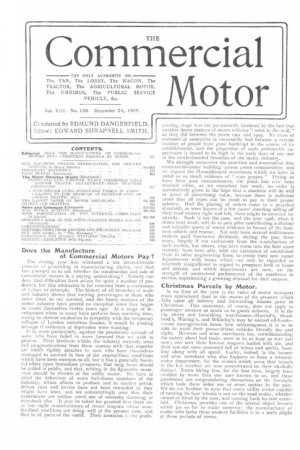Does the Manufacture of Commercial Motors Pay ?
Page 1

If you've noticed an error in this article please click here to report it so we can fix it.
The closing year has witnessed a not inconsiderable amount of grumbling in manufacturing circles, and that fact prompts us to ask whether the construction and sale of connitercial motors is a paying undertaking? Nobody can deny that difficulties have arisen for quite a number of producers, but this admission is far removed from a confession of fttilure in principle. The history of all branches of trade and industry shows that varying percentages of those who enter them do not succeed, and the heavy sections of the motor industry have proved no exception since they began to assert themselves twelve years ago. At a stage of development when so many have perforce been marking time, owing to adverse tendencies in sympathy with the temporary collapse of London motorbus finance, it would be passing strange if evidences of depression were wanting. It is, more particularly, against the pessimistic attitude of scam who have failed to move forward that we wish to protest. Their brethren within the industry certainly treat evil prognostications • from these sources with that superior air which rightly attaches to men who have themselves managed to succeed in face of the unpropitious conditions which have been common to all, but it has a generally harmful effect upon immediate prospects, that long faces should be pulled in public, and that, writing in the figurative sense, mud should be thrown at the utility motor. We have in mind the behaviour of some half-dozen members of the industry, whose efforts to produce and to market petroldriven vans and lorries have not been rewarded as they might have been, and we unhesitatingly aver that their experiences are neither novel nor of necessity damning to everybody else. It may be taken for granted that there are at last eight manufacturers of steam wagons whose standardised machines are doing well-at the present time, and that in all parts of the world. Their accession to the profit earning stage was not permanently hindered by the fact that another dozen makers of steam vehicles " went to the wall," as they did between the years 190o and 1905. No class of commercial enterprise is necessarily bad because a certain number of people have gone bankrupt in the course of its establishment, and the proportion of such undesirable experiences is bound to be high in the early days of any one of the newly-founded branches of the motor industry.
We strongly controvert the assertion and assumption that commercial-motor building cannot prove remunerative, and we regard the ill-conditioned statements which we have in mind as so much evidence of " sour grapes." Trying as have been past circumstances, the point has now been reached when, as we remarked last week, no order is speculatively given in the hope that a machine will do well or prove of advertising value, because there is sufficient proof that all types can be made to pay in their proper spheres. Had the placing of orders come to a practical standstill, or were buyers of a few years, standing selling off their road motors right and left, there might be occasion for anxiety. Such is not the case, and the year 1908, when it closes next week, will do so only after contributing a distinct and valuable quota of sound evidence in favour of the business vehicle and tractor. Not only have several well-known makers paid handsome dividends, during the past three years, largely if not exclusively from the manufacture of such models, but others, who have come into the field more recently, have been able, with the assistance of established trade in other engineering lines, to create their new motor departments with losses which can only be regarded as relatively insignificant in regard to prospects both at home and abroad, and which departments are now, on the strength of ascertained performance of the machines in service, experiencing a growing demand for their outputs.




















